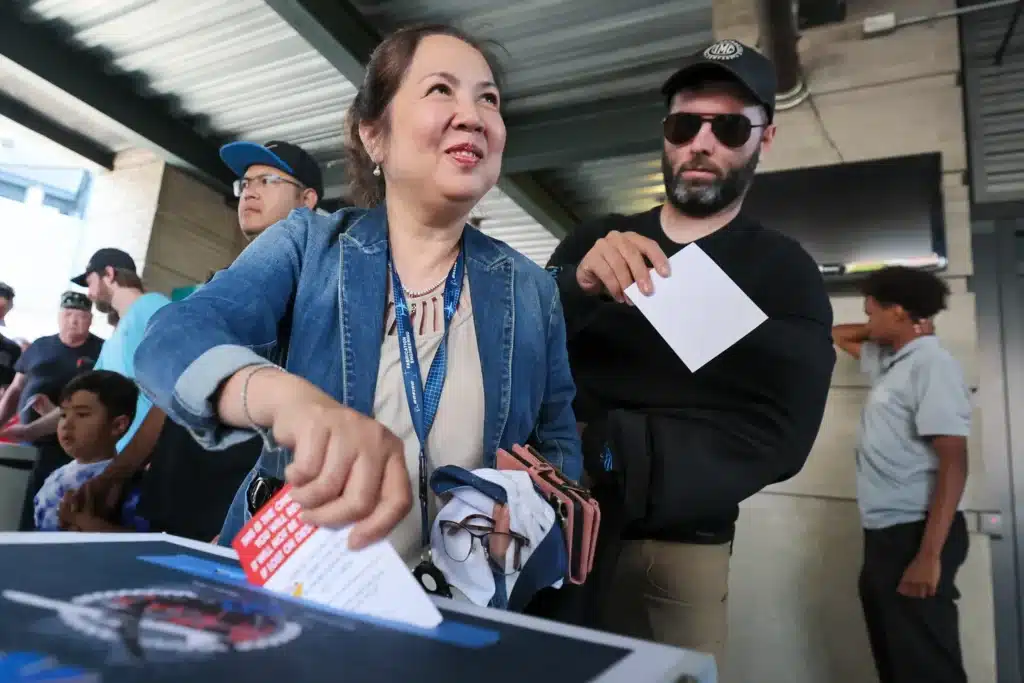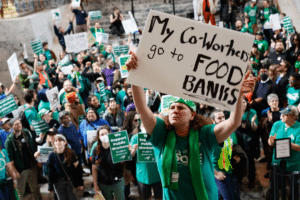
Seattle Times
Lauren Rosenblatt
Updated July 17, 2024
Thousands of Boeing’s union Machinists gathered at Seattle’s Major League Baseball stadium Wednesday to declare they are ready to walk off the job this fall if the company doesn’t substantially boost their pay and benefits.
Waving white towels and wearing shirts that read “Our future. Our Fight,” more than 20,000 people gathered at T-Mobile Park for a strike authorization vote — a signal that the workers are ready to strike if an agreement isn’t reached before the union’s current contract expires in September. Around the ballpark, signs read “No pay. No planes.” and “Skilled labor has a price.”
The workers, represented by the International Association of Machinists and Aerospace Workers union, are asking for higher pay, more generous retirement benefits, including restoring a pension plan that the union lost 10 years ago, and an end to mandatory overtime work. They’re also seeking a commitment from Boeing that it will keep production work in Washington state, particularly as it looks toward its next new jet.
It’s the first time the union and Boeing have negotiated an entirely new contract in 16 years. According to the union, 99% of workers voted to authorize a strike.
“You are showing the Boeing company that you care about this contract,” Richard Jackson, secretary-treasurer for IAM District 751, told the crowd. “2024 will bring home the best damn contract aerospace workers have ever seen.”
The strike authorization vote does not guarantee workers will walk out in September when the contract ends. But it may send a message to Boeing — employees will act if the contract doesn’t meet their expectations. The IAM members would vote again before walking out.
A strike would put already-struggling Boeing in an even more precarious position as the company continues to attempt to recover from a Jan. 5 blowout attributed to assembly mistakes by Boeing. The company also continues to face repercussions from two fatal MAX crashes five years ago. Boeing, which pleaded guilty this month to a federal fraud charge related to those crashes, is now under increased oversight from the Federal Aviation Administration and faces the possibility of an independent monitor.
“We have to save this company from itself. We have to push them further than we have before,” said Jon Holden, president of IAM District 751. “We are the watchdog with a unique opportunity to make things better for all. I want you to be proud of this company again.”
In response to the January incident, Boeing slowed production as it focuses on quality and safety. That slow down comes as Boeing badly trails European rival Airbus.Any work stoppage from the nearly 33,000 machinists represented by the IAM in Washington and Portland threatens an even longer delay in getting jets out of the factory and to customers.
Prior to Wednesday’s strike vote, Boeing said it remained “confident we can reach a deal that balances the needs of our employees and the business realities we face as a company.”
But workers gathered at T-Mobile Park said they were prepared to strike if the company didn’t meet their demands, particularly around wages and better retirement benefits. The union is asking for a 40% wage increase over the three-year contract.
Last year, Boeing raised its new-hire pay rates; the lowest-level mechanic will start at $23.50 an hour. After six years, Boeing machinists get boosted to a maximum pay rate of between $40 an hour and $51.30 an hour, depending on job skill grade.
“I love what I do … building something that goes into the air. But sometimes it feels like the work is not appreciated,” said Kevin Ly, who has worked at Boeing for five years and is currently based in Everett. “Right now, it feels like there’s nothing to work toward.”
Workers marched through the factory every Wednesday in the weeks leading up to the vote to gather support and draw attention to the union’s demands, said Ly, a 24-year-old Marysville resident. The possibility of a new contract, he said, is “something we should all be excited for.”
‘A long time coming’
The strike authorization vote — and feelings of excitement, optimism and muted aggression on display Wednesday — are decades in the making.
The union has been locked into its contract for the past 16 years, and has had to make concessions since then under threat from Boeing that it would move production outside of Washington if the union did not concede.
IAM made those concessions while members were still working under an existing contract, and did not have the option to strike. In 2011, the union agreed to higher health care costs in order to secure production of the then-new 737 MAX at Boeing’s Renton plant. In 2013, Boeing again threatened to move work out of state; this time focused on production of the 777X in Everett.
Workers initially rejected the offer but the IAM’s national leadership set up a second, last-minute vote on Jan. 3, 2014, while many senior machinists were on vacation. With 51% of the vote, Boeing and the IAM agreed to the mid-contract negotiations, with workers giving up traditional pensions, settling for 4% wage increases over the following eight years and taking on higher health care costs.
In 2016, the IAM District 751 passed an amendment to its constitution to prevent mid-contract negotiations without a vote of the full membership.More than 10 years later, many workers still feel betrayed by that 2014 vote, and hope the new contract would return what was lost. Even workers who were not there at the time said they knew what friends and family had given up.
“It’s been a long time coming, I think it’s overdue,” said Ryan Rumsey, who has worked at Boeing for a year and half. His father and grandfather worked at the company for decades and told him he had to get a job there. His wife, Rubi, joined the company three months ago.
“It’s going to be so rewarding seeing this contract in place,” Rumsey said.
IAM International president Brian Bryant attended Wednesday’s rally to tell current members the parent union has their backs. Traveling through the U.S. and Canada, Bryant said he had told other union members “what is at stake at Boeing here in the Pacific Northwest.”
A tumultuous 6 months
The union has been gearing up for Wednesday’s strike authorization vote since at least March 2020, when it told workers in its monthly newsletter to start putting money aside for a strike fund if they ultimately walk out.
At that time, Boeing was dealing with the fallout from two fatal MAX crashes, which would lead to a months-long grounding of the plane, and the start of the COVID-19 pandemic, though it wasn’t then clear how long the virus would impact air travel and Boeing’s business.
Four years later, Boeing’s position remains unsettled, particularly after a panel blew off a 737 MAX jet midflight in January.
Since then, the FBI and the FAA have opened investigations into the incident. An FAA-convened expert panel found Boeing’s safety culture is lacking and that employees are afraid to speak up out of fear of retaliation.
The company recently said it will acquire Spirit AeroSystems, the supplier that builds 737 fuselages before they are shipped to Renton, and slowed production.
Machinists at Spirit went on a six-day strike last year before agreeing to a contract that included higher wages, better health care and a limit to mandatory overtime.
Earlier this month, Boeing pleaded guilty to a criminal fraud charge stemming from the fatal MAX crashes, agreeing to another $244 million fine and an independent monitor to oversee the company’s compliance with promised safety and quality changes.
Union leaders did not directly address the recent incidents at Wednesday’s rally, but the crowd erupted in cheers when Holden said Boeing had been making decisions based on the executives on the 50th floor rather than what’s happening on the factory floor.
Liz Shuler, the president of the AFL-CIO, who came to show solidarity with the IAM workers, told the crowd “this is what happens when you put profits over people.”
“Who innovated over decades? Who made Boeing the standard of aerospace all over the world? You did,” Shuler said. “We’re seeing what happens when work is not valued.”
‘Sending a message’
In negotiations that started in March, workers have asked for higher wages, a more comprehensive retirement plan and affordable health care options. Workers are also hoping for an end to mandatory overtime hours and quicker progression steps to help facilities promotions, and raises.
The union is also asking for a guarantee that Boeing will continue to build its current airplanes and future jets in Washington.
The current contract expires on Sept. 12. The strike could begin at midnight Sept. 13.
In 2008 — before the panel blowout, the MAX crashes, the COVID pandemic and the threats to move work out of Washington — Boeing machinists walked out for an eight-week strike.
After 57 days off the job, the workers agreed to a contract that increased wages by $1 an hour for lower-paid machinists, limited outsourcing and allowed members to retain their medical benefits.
“The strike sanction vote in 2008 at the KeyArena (now Climate Pledge Arena) is a day we’ll never forget,” IAM district 751 chief Jason Chan wrote in the union’s monthly newsletter ahead of this year’s strike authorization vote. “We had silenced the factories by laying down our tools and joining together with one powerful voice to declare that we would do whatever it took to secure a contract worthy of our members’ generations of hard work and dedication.”
Now, the machinists are ready to silence the factories once more, Holden said Wednesday.
“Today is about sending a message,” he said. “We will stand together and fight for what we deserve.”
Read the original article here.




